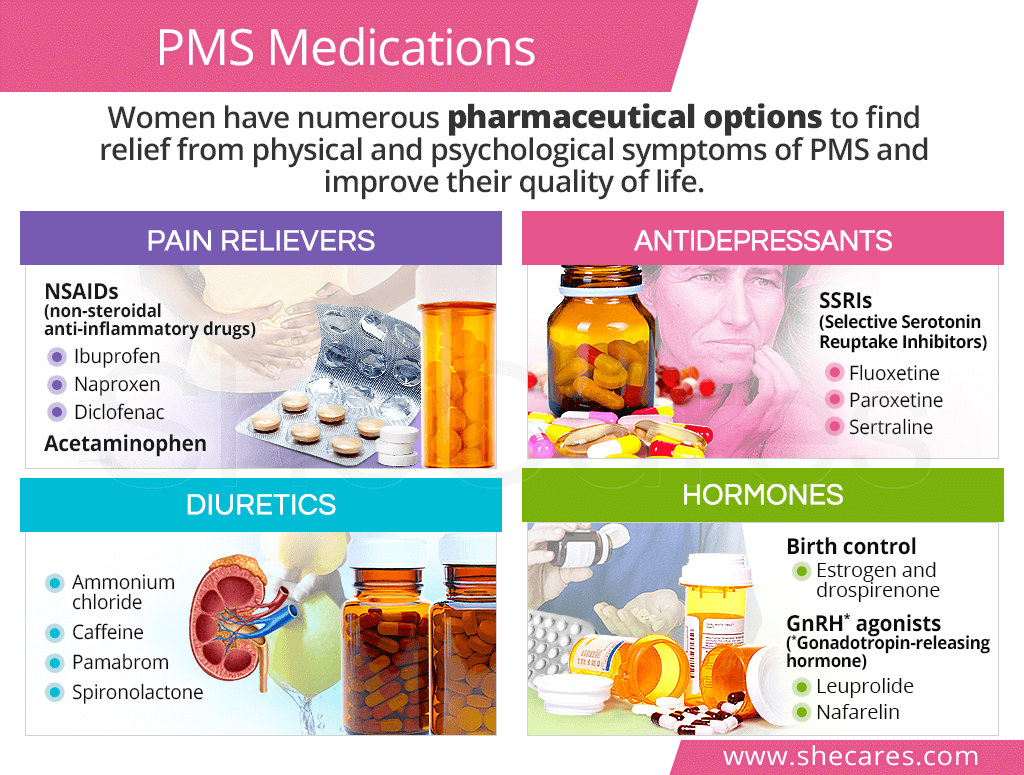Pain Relievers for PMS
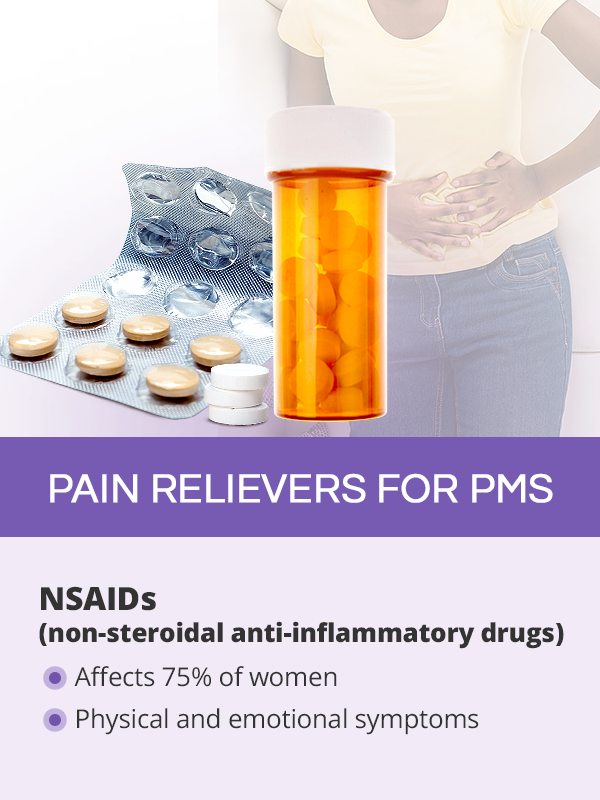
While many women with mild to moderate symptoms are able to manage them with natural remedies for PMS, others reach for pain-relieving medications to reduce menstrual cramps, headaches, muscle tension, and breast tenderness.
The best PMS medicine for these symptoms are non-steroidal anti-inflammatory drugs (NSAIDs), which alleviate pain by reducing prostaglandins and inflammation. NSAIDs can be bought with and without a prescription, depending on the strength.
Over-the-Counter Pain Relievers for PMS
Over-the-counter (OTC) medications for PMS are available without prescription in virtually all pharmacies and supermarkets at relatively low prices. They allay low to moderate discomforts and include the following:
- Ibuprofen
- Naproxen
- Aspirin
- Ketoprofen
Another type of OTC PMS medication that do not belong to NSAIDs is acetaminophen, which can also relieve mild PMS symptoms. However, it does not help reduce inflammation caused by prostaglandins.
For best results, pain relievers for PMS can be taken one day before an expected period or with the onset of symptoms and continued for two to three days. 2
Prescription Pain Relievers for PMS
For more intense physical symptoms of PMS and other menstrual disorders, like heavy periods, stronger NSAIDs might be needed. These can be purchased at the pharmacies with doctor's prescription and include the following:
- Diclofenac
- Mefenamic acid
- Etodolac
Antidepressants for PMS
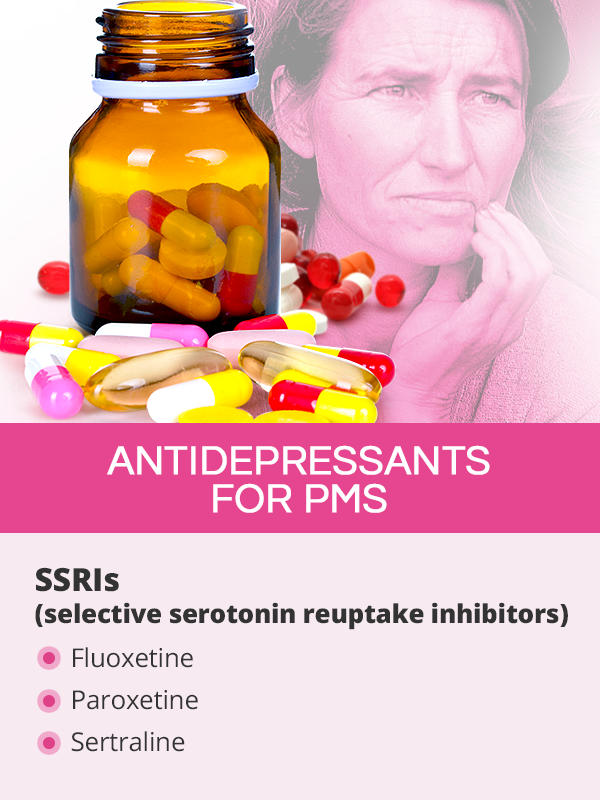
Women with intense psychological PMS symptoms - such as mood swings, depression, or irritability, or those that can be classified as part of premenstrual dysphoric disorder (PMDD)due to their extreme nature - might need antidepressant medications.
The most popular type of antidepressants for PMS are selective serotonin reuptake inhibitors (SSRIs), which work by increasing serotonin levels, a neurotransmitter that plays a key role in mood control. The most common types of SSRIs are:
- Fluoxetine
- Paroxetine
- Sertraline
- Citalopram
Generally, antidepressants have to be taken daily for a continuous period of time to bring the desired results. In some cases, however, women might be instructed to only take them during the luteal phase of their menstrual cycle.
Diuretics for PMS
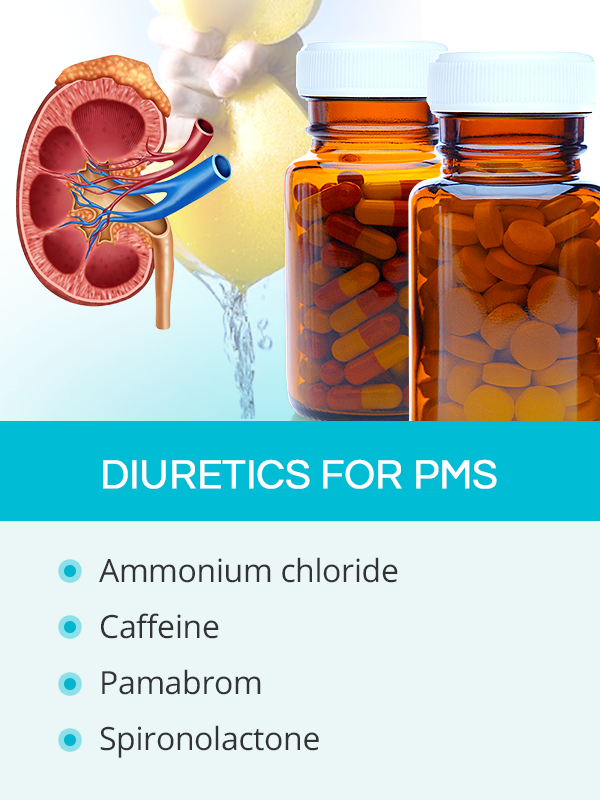
Other bothersome PMS symptoms, like bloating, swollen breasts, or weight gain, can also be relieved with medications alongside small diet changes, including limiting salt intake.
The class of medications for PMS bloating are called diuretics, or water pills, which work by increasing urination to reduce water build-up and alleviate bloating. The most popular water pills contain one of the following ingredients:
- Ammonium chloride (OTC)
- Caffeine (OTC)
- Pamabrom (OTC)
- Spironolactone (Prescription)
It is important to keep in mind that diuretics for PMS should not be taken at the same time with NSAIDs as they can increase the risk of kidney damage.3
Hormonal PMS Medicines
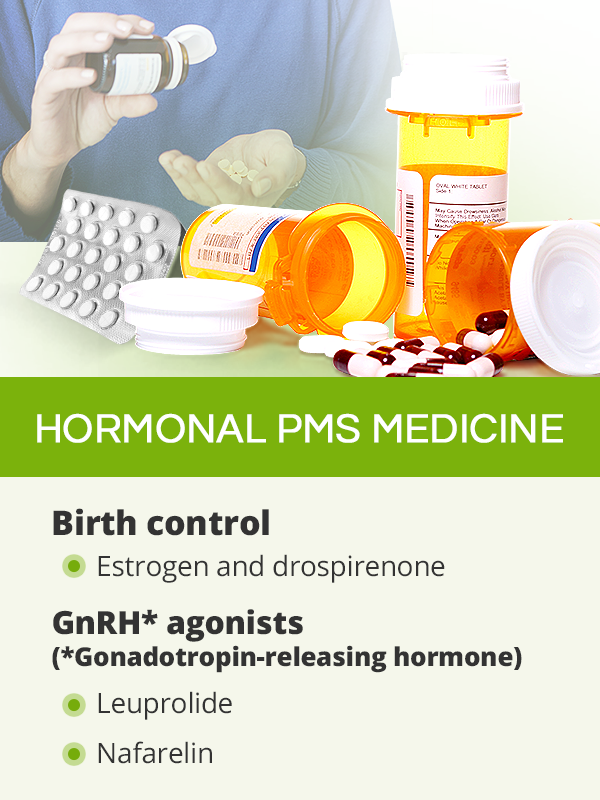
Women struggling with intense PMS and PMDD symptoms, like cramps, headaches, mood swings, or fatigue, might consider hormonal treatment, as long as they are not intending to get pregnant.
These medications - which include birth control and GnRH analogs- alter reproductive hormone production in the body, which causes changes in menstrual patterns and brings relief from PMS symptoms.
Birth Control for PMDD and PMS
Birth control medications containing estrogen and drospirenone (a form of progestin) can be prescribed for PMS symptoms. They work by suppressing ovulation and regulating hormone levels to ease unpleasant discomforts.
The most common means of administration are birth control pills. However, other forms, like birth control patches, are also available.
GnRH Agonistsfor PMS
Gonadotropin-releasing hormone (GnRH) agonistsor analogues work by halting ovarian hormone production, thus stopping ovulation and lessening PMS symptoms.
As a result, the body enters a temporary state of induced menopause, which may bring symptoms like hot flashes or vaginal dryness. The most studied types of GnRH agonists are as follows:
- Leuprolide
- Nafarelin
- Goserelin
Because GnRH agonists induce low hormone levels, they are generally not used for longer than six months.4 Also, to maintain bone health, an “add-back” treatment with low-dose estrogen combined with progestin might be needed.
Key Takeaways
Without a doubt, women have numerous options when it comes to choosing the right pharmaceuticals for their PMS symptoms. However, before starting any PMS medications, it is also recommended to first discuss with a doctor potential drug allergies or other contraindications. The majority of women can find relief from physical PMS symptoms with over-the-counter pain relievers, such as ibuprofen, or stronger prescription medications, like diclofenac. For psychological symptoms, like intense mood swings, women might be offered antidepressants. Another type of PMS medication is diuretics that tackle bloating and breast swelling typical to PMS. At last, women who are not planning for pregnancy may consider birth control pills or GnRH agonists to alter their menstrual cycle for lasting relief.
Sources
- American College of Obstetricians and Gynecologists. (n.d.). Premenstrual Syndrome (PMS). Retrieved March 18, 2020 from https://www.acog.org/patient-resources/faqs/gynecologic-problems/premenstrual-syndrome
- Better Health Channel. (2018). Menstruation – pain (dysmenorrhea). Retrieved March 18, 2020 fromhttps://www.betterhealth.vic.gov.au/health/conditionsandtreatments/menstruation-pain-dysmenorrhoea
- Cleveland Clinic. (2014). Dysmenorrhea: Management and Treatment. Retrieved March 18, 2020 from https://my.clevelandclinic.org/health/diseases/4148-dysmenorrhea/management-and-treatment
- Cochrane Library. (2014). Gonadotropin-releasing hormone (GnRH) analogues for premenstrual syndrome (PMS). Retrieved March 18, 2020 from https://www.cochranelibrary.com/cdsr/doi/10.1002/14651858.CD011330/full
- Harvard Health Publishing. (n.d.). Treating premenstrual dysphoric disorder. Retrieved March 18, 2020 from https://www.health.harvard.edu/womens-health/treating-premenstrual-dysphoric-disorder
- InformedHealth.org. (2019). Period pains: Can anti-inflammatory drugs help? Retrieved March 18, 2020 from https://www.ncbi.nlm.nih.gov/books/NBK279323/
- Medline Plus. (n.d.). Period Pain. Retrieved March 3, 2020 from https://medlineplus.gov/periodpain.html
- Office on Women's Health. (2018). Premenstrual Syndrome (PMS). Retrieved March 18, 2020 from https://www.womenshealth.gov/menstrual-cycle/premenstrual-syndrome
- Planned Parenthood. (n.d.). What can I do about cramps and PMS? Retrieved March 18, 2020 from https://www.plannedparenthood.org/learn/health-and-wellness/menstruation/what-can-i-do-about-cramps-and-pms
Footnotes:
- Mayo Clinic. (n.d.). Premenstrual syndrome (PMS). Retrieved March 18, 2020 from https://www.mayoclinic.org/diseases-conditions/premenstrual-syndrome/symptoms-causes/syc-20376780?p=1
- Mayo Clinic. (2018). Menstrual cramps. Retrieved March 18, 2020 from https://www.mayoclinic.org/diseases-conditions/menstrual-cramps/diagnosis-treatment/drc-20374944
- Mayo Clinic. (2019). Women's Health. Retrieved March 18, 2020 from https://www.mayoclinic.org/healthy-lifestyle/womens-health/in-depth/water-retention/art-20044983?p=1
- InformedHealth.org. (2017). Premenstrual Syndrome: Treatment for PMS. Retrieved March 18, 2020 from https://www.ncbi.nlm.nih.gov/books/NBK279264/
